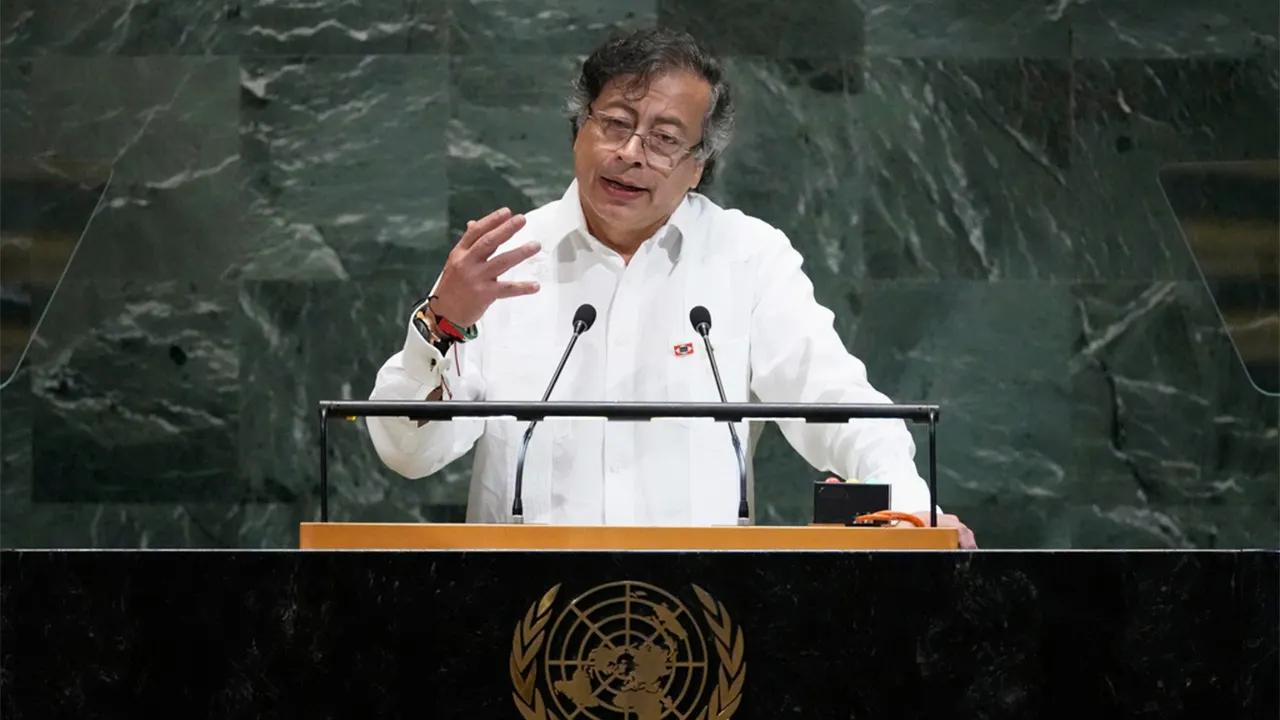
NORTH AMERICA
Written by Stylo News: AI-Powered, Multi-Source Global News

Images © their owners, publicly available, for informational purposes.
Map of Events
The key events occurred in New York City, United States, involving Colombian President Gustavo Petro during the United Nations General Assembly week.
Locations
Event Updates
U.S. Revokes Colombian President Gustavo Petro's Visa Following Incendiary Speech in NYC
Executive Summary
On September 27, 2025, the Trump administration announced the revocation of Colombian President Gustavo Petro's U.S. visa. This action was taken after Petro reportedly stood on a street in New York City during the United Nations General Assembly week and urged U.S. soldiers to disobey orders and incite violence during a demonstration against Israel. The U.S. State Department publicly condemned Petro's actions as "reckless and incendiary." This visa revocation follows a series of tense interactions between the Trump administration and President Petro, including Petro's calls for criminal investigations against Trump and other U.S. officials over U.S. military strikes on boats in the Caribbean alleged to be drug traffickers' vessels. Petro, Colombia's first leftist president and former Marxist guerrilla, has criticized the Trump administration's policies on migration and military actions, leading to a strained bilateral relationship. Earlier in 2025, Petro claimed his U.S. travel visa had been revoked, which limited his ability to attend international meetings in Washington, D.C. The recent revocation formalizes this action. The situation highlights escalating diplomatic tensions between Colombia and the United States under the Trump administration.
Situation
The situation escalated during the annual U.N. General Assembly in New York City, where President Petro addressed a crowd protesting against Israel and its Prime Minister Benjamin Netanyahu. Videos circulated showing Petro's speech where he allegedly encouraged U.S. soldiers to disobey orders, prompting the U.S. State Department to announce the visa revocation. Petro had earlier condemned U.S. strikes on Caribbean boats, calling for criminal proceedings against U.S. officials, including President Trump, accusing them of tyranny and criminalizing poverty and migration. The Trump administration had previously threatened economic measures against Colombia, such as tariffs, in response to Petro's policies, and Petro had threatened retaliatory tariffs before relenting. The revocation of Petro's visa is a significant diplomatic rebuke, reflecting deteriorating relations. National responses include the U.S. State Department's public condemnation and revocation of the visa, while Colombia has not officially responded to this latest development. Petro's prior statements suggest continued opposition to U.S. policies. The timeline includes Petro's election as Colombia's first leftist president, his critical stance on U.S. policies, the January tariff threats, the April visa revocation claim by Petro, and the September incident leading to the official visa revocation.
International Impact
The visa revocation of a sitting head of state is a rare and severe diplomatic measure, signaling significant strain in U.S.-Colombia relations. It may affect Colombia's engagement with international organizations in the U.S. and complicate bilateral cooperation on issues such as drug trafficking and migration. Petro's criticisms of U.S. military actions and migration policies resonate with other Latin American leftist leaders, potentially influencing regional dynamics. International leaders have yet to publicly respond to the visa revocation, but the incident underscores tensions between the U.S. and leftist governments in Latin America. Petro's call for investigations into U.S. officials could further inflame diplomatic disputes. The situation may impact U.S. influence in the region and raise questions about diplomatic protocols and respect for sovereign leaders during international assemblies.
Decision Maker Perspectives
U.S. State Department: Revoked President Petro's visa due to his public urging of U.S. soldiers to disobey orders and incite violence, labeling his actions as reckless and incendiary, reflecting a firm stance against perceived threats to U.S. military discipline and authority.
President Gustavo Petro: Criticizes U.S. military actions and policies, calls for criminal investigations against U.S. officials including President Trump, and challenges U.S. influence, positioning himself as a leftist leader opposing U.S. policies and defending marginalized groups.
Trump Administration: Maintains a hardline approach towards Petro's government, including threats of tariffs and visa restrictions, aiming to pressure Colombia on issues like deportations and counter-narcotics efforts, and responding decisively to perceived provocations.
Source Perspectives
Fox News: Reports the visa revocation as a significant diplomatic action by the Trump administration, highlighting Petro's incendiary speech and critical stance towards U.S. policies, reflecting a perspective that emphasizes law and order and U.S. sovereignty.
U.S. State Department (via X/Twitter): Officially condemns Petro's actions and justifies the visa revocation, presenting a firm government stance against incitement of violence and disobedience within U.S. military ranks.